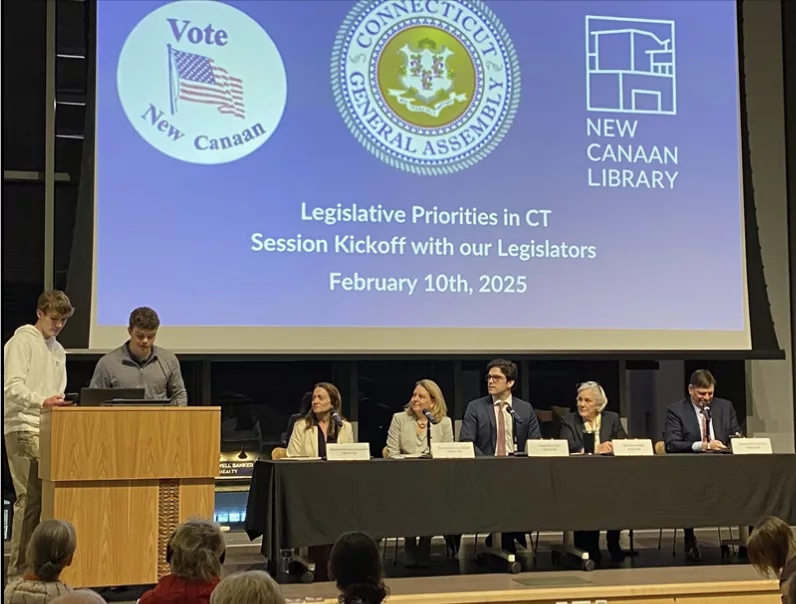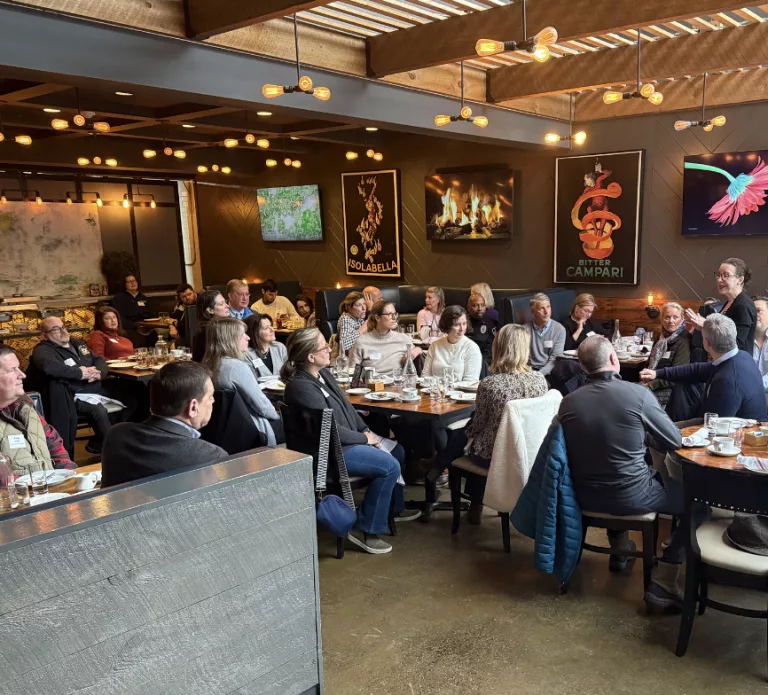
By Peter Barhydt
Local legislators gathered at the New Canaan Library for a legislative forum hosted by the Youth Board of New Canaan’s League of Women Voters. The event, led by student moderators Spencer Weil of St. Luke’s School and Will Wunderlich of New Canaan High School, provided a platform for elected officials to share their priorities for the current legislative session and engage with community members on key issues. The evening saw lively discussions on pressing matters such as energy costs, economic stability, environmental policies, and education.
The panel featured State Representatives Lucy Dathan, Tom O’Dea, and Savet Constantine, as well as State Senators Ryan Fazio and Ceci Maher. Over the course of the evening, the legislators engaged in a robust exchange of ideas, offering insights into ongoing legislative efforts and responding to questions from the audience.
Weil opened the forum by extending an invitation to legislators to visit both local high schools for further discussion. “While we’re up here, we’d love to host our local legislators at a joint meeting of both our schools one of these days, so maybe we can talk after the program,” he said. Wunderlich then introduced the evening’s agenda, noting that students had polled their peers on pressing topics such as energy, inflation, free school lunches, student loans, and reproductive health.
Representative Tom O’Dea, who has served the 125th District for 13 years, emphasized the bipartisan nature of Connecticut’s legislative process. “Unlike Washington, D.C., Hartford is very bipartisan,” he said. “Eighty-five percent of our bills are bipartisan, and my colleagues in the majority have always allowed us to debate bills and take our input.” He highlighted his work on the Judiciary, Transportation, and Environment Committees, stressing the importance of school choice, fiscal guardrails, and affordable housing. He further emphasized a bill he is co-sponsoring that would provide municipalities with the right of first refusal in affordable housing projects, ensuring that local governments have more control over developments in their communities.
Senator Ceci Maher, who represents multiple Fairfield County towns, outlined her focus on childcare and food security. “Childcare is a labor issue, a workforce issue,” she said. “It’s very expensive, hard to find, and very difficult for working parents.” She also spoke on environmental initiatives, particularly flood mitigation and resiliency planning. “With increasing storms and flooding, our infrastructure needs urgent attention,” Maher stated, advocating for increased funding toward municipal climate resilience projects.
Senator Ryan Fazio underscored the need for fiscal responsibility, particularly in relation to Connecticut’s tax policies. “Every single dollar spent eventually is a dollar that has to be raised in taxes,” Fazio said. He advocated for lowering licensing fees for professionals, cutting utility costs, and protecting local zoning control. “We need to ensure economic growth and opportunity across the board in Connecticut,” he added. He also pointed to concerns regarding an ongoing water utility acquisition, warning that such a deal could negatively impact consumer costs in New Canaan and beyond.
Representative Lucy Dathan, who represents parts of New Canaan and Norwalk, focused on healthcare affordability and fiscal oversight. “One of my top priorities is lowering the cost of healthcare,” she said. Dathan also highlighted the need to update Medicaid reimbursement rates and ensure responsible government spending. “We have oversight over our state’s budget and agency budgets to make sure they are being used as intended.” She provided attendees with materials outlining current healthcare policy proposals and their potential impacts on Connecticut residents.
Representative Savet Constantine, newly elected to represent the 42nd District, which includes parts of New Canaan, Wilton and Ridgefield, stated “As I listen to all my colleagues, so much of the work that we are doing is overlapped, because all these issues are important to you, so they’re important to us, and they’re important to us to make sure that we get addressed up at the capitol. She detailed her focus on special education funding, energy costs, and senior healthcare services. “Special education costs have skyrocketed, and we need to address it,” he said, noting upcoming hearings on the topic. She also stressed the need for workforce development initiatives that support career training programs for young professionals entering the job market.
The forum transitioned to a Q&A session, where students and community members pressed legislators on Connecticut’s environmental policies. One asked how the state is balancing economic interests with long-term environmental goals.
Senator Fazio highlighted his legislative efforts to promote nuclear energy. “Advanced nuclear will start to be commercialize in ten years,” he stated. “Two years ago, I passed a law to include new nuclear development in our state’s renewable portfolio standard, meaning it would get equal subsidy treatment as all other forms of clean energy.”
Senator Maher echoed support for nuclear energy but also emphasized local sustainability efforts. “We must look at the ways we are dealing with our waterways, roads, and runoff,” she said, noting recent infrastructure challenges in Redding and Weston due to flooding. She also pointed to the state’s efforts in supporting municipal-level renewable energy projects, such as solar panel expansion on public buildings.
Representative Dathan took a more urgent stance on climate action. “2024 was the hottest year on record, and it just keeps going in the wrong direction,” she said. “I don’t think we have ten years to wait. Action needs to be taken now.” She proposed incentives for homeowners to transition to energy-efficient heating and cooling systems.
An audience member raised concerns about Connecticut’s ability to attract and retain businesses. Fazio pointed to high taxes and energy costs as major deterrents. “Reducing the tax burden, protecting the budgetary guardrails, and lowering healthcare and energy costs will yield economic growth,” he said.
Maher added that housing is a critical factor in business retention. “When companies consider moving here, they ask, ‘Where will my employees live?’ We need to address housing challenges to ensure Connecticut remains an attractive place for businesses.” She suggested revising zoning regulations to facilitate the development of workforce housing.
O’Dea stressed the importance of maintaining the state’s fiscal guardrails. “Raise your hand if you want to borrow more from your kids. I don’t,” he said. “We need to get our debt down.”
The discussion turned to Governor Ned Lamont’s proposed universal pre-K program. Maher described a pilot program in Middletown that could serve as a model. “They started a pre-K academy, utilizing schoolteachers and existing classrooms,” she explained. “We need to ensure it’s not an unfunded mandate and that it works for all districts.”
Dathan emphasized early education’s long-term benefits. “When you identify learning challenges early, it reduces the burden on schools later,” she said. “Investing in early education is an investment in our economy.”
As the forum concluded Wunderlich encouraged attendees to stay engaged in local government. “The Youth Board of New Canaan’s League of Women Voters is always open to students interested in civics education,” he said.
The legislators thanked the students and community members for their participation, with O’Dea remarking, “It’s forums like this that make our work meaningful. We are here to listen, and we appreciate your voices.”
For more information on the New Canaan League of Women Voters, please visit: www.lwv.org/local-leagues/lwv-new-canaan.



